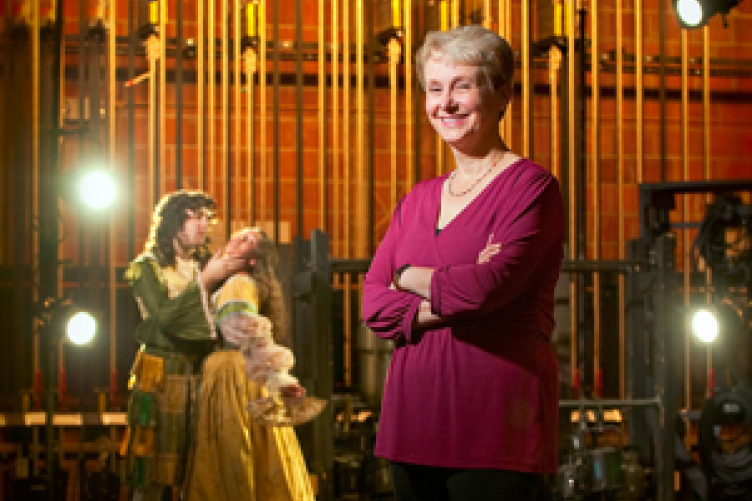
Deborah Kinghorn, associate professor of theatre and dance, has received a prestigious Fulbright Award to teach and help launch a new post-doctoral program at the University of Rijeka, Croatia, during the 2012-13 academic year.
“This is a wonderful recognition of the role Professor Kinghorn is playing in furthering the mission of her mentor and renowned voice and movement trainer, Arthur Lessac, who passed away last year. This award affords Professor Kinghorn, who is a Lessac master teacher, the opportunity to provide extended training to Croatian students in Lessac’s program at the University of Rijeka and to bring the lessons of that unique experience back to UNH students. The Fulbright Program has made an excellent choice,” said Ken Fuld, dean of the UNH College of Liberal Arts.
A UNH faculty member since 2000, Kinghorn teaches voice, movement, and acting in holistic fashion, which results in greater flexibility and power and improved expressiveness and communication. A master teacher in Lessac Kinesensic Training, Kinghorn’s work is based on that of pioneering teacher Arthur Lessac, who created the kinesensic approach to developing voice and body strength, power, and expressiveness.
Lessac was Kinghorn’s mentor until his death in 2011. At the time of his death, Lessac was collaborating with stage and film actor Rade Serbedjia to create a new voice, movement and acting program at the University of Rijeka. Shortly before his death, Lessac selected Kinghorn, who helped form and was the first president of the Lessac Training and Research Institute, to continue his work at the university and help launch the new post-doctoral program “Acting, Media, and Culture.” In her upcoming Fulbright semester, Kinghorn and students will create a play focusing on the long-term effects of war on women.
“Lessac’s work began in the theatre, but it grew beyond that domain to other fields, including sports, where he taught runners to run more efficiently thus improving their speed and endurance and reducing injury, to physical and vocal therapy, where victims of stroke re-learned facial muscular use, and by applying singing techniques to speaking, improved articulation and connected speech. The athletes and the victims of injury and infirmity experienced better functioning and with it an increase in confidence and sense of well-being,” Kinghorn said.
“His work in South Africa with the indigenous tribes, the British, and the Afrikaaners demonstrated the effectiveness of kinesensics to help those who have suffered because of war or repression to regain their individual voices, their cultural voice, and eventually their potential as a society. How proud he would be to see this program at the University of Rijeka, in Croatia, come to fruition. I am humbled and honored to have been asked to spearhead the undertaking,” she said.
Kinghorn holds degrees from SUNY at Fredonia (bachelor’s in theatre) and Trinity University through the Dallas Theatre Center (MFA in theatre, with emphasis in acting). She has also done a year of intensive study in acting, voice and movement at the Manchester Polytechnic School of Theatre in Manchester, England. She is a member of the Voice and Speech Trainer's Association (VASTA).
Established in 1946, the Fulbright Program is the flagship international educational exchange program sponsored by the U.S. government and is designed to increase mutual understanding between the people of the United States and the people of other countries. With this goal as a starting point, the Fulbright Program has provided almost 300,000 participants—chosen for their academic merit and leadership potential — with the opportunity to study, teach and conduct research, exchange ideas and contribute to finding solutions to shared international concerns.
The University of New Hampshire, founded in 1866, is a world-class public research university with the feel of a New England liberal arts college. A land, sea, and space-grant university, UNH is the state's flagship public institution, enrolling 12,200 undergraduate and 2,300 graduate students.
Learn more about Professor Kinghorn
Originally published by:
UNH Media Relations



















































